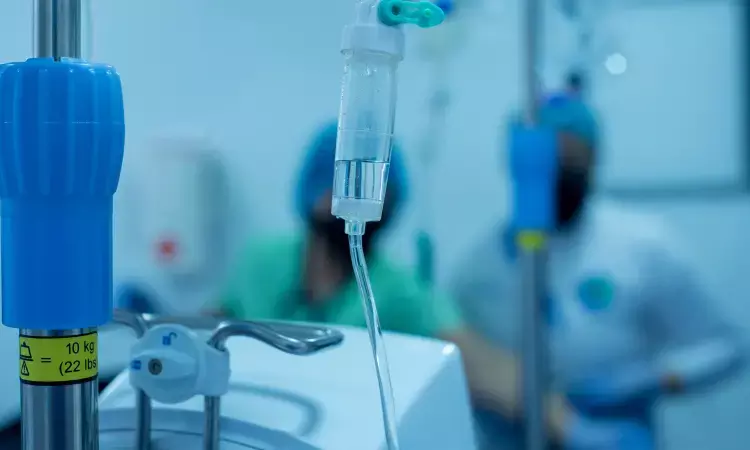- Home
- Medical news & Guidelines
- Anesthesiology
- Cardiology and CTVS
- Critical Care
- Dentistry
- Dermatology
- Diabetes and Endocrinology
- ENT
- Gastroenterology
- Medicine
- Nephrology
- Neurology
- Obstretics-Gynaecology
- Oncology
- Ophthalmology
- Orthopaedics
- Pediatrics-Neonatology
- Psychiatry
- Pulmonology
- Radiology
- Surgery
- Urology
- Laboratory Medicine
- Diet
- Nursing
- Paramedical
- Physiotherapy
- Health news
- Fact Check
- Bone Health Fact Check
- Brain Health Fact Check
- Cancer Related Fact Check
- Child Care Fact Check
- Dental and oral health fact check
- Diabetes and metabolic health fact check
- Diet and Nutrition Fact Check
- Eye and ENT Care Fact Check
- Fitness fact check
- Gut health fact check
- Heart health fact check
- Kidney health fact check
- Medical education fact check
- Men's health fact check
- Respiratory fact check
- Skin and hair care fact check
- Vaccine and Immunization fact check
- Women's health fact check
- AYUSH
- State News
- Andaman and Nicobar Islands
- Andhra Pradesh
- Arunachal Pradesh
- Assam
- Bihar
- Chandigarh
- Chattisgarh
- Dadra and Nagar Haveli
- Daman and Diu
- Delhi
- Goa
- Gujarat
- Haryana
- Himachal Pradesh
- Jammu & Kashmir
- Jharkhand
- Karnataka
- Kerala
- Ladakh
- Lakshadweep
- Madhya Pradesh
- Maharashtra
- Manipur
- Meghalaya
- Mizoram
- Nagaland
- Odisha
- Puducherry
- Punjab
- Rajasthan
- Sikkim
- Tamil Nadu
- Telangana
- Tripura
- Uttar Pradesh
- Uttrakhand
- West Bengal
- Medical Education
- Industry
Premedication with Dexmedetomidine increases sedation and reduces stress due to tracheal intubation

China: According to a study published in BMC Anesthesiology, premedication with Oral Dexmedetomidine (DEX 4 ug/kg) is an efficient intervention which increases preoperative sedation. This intervention ameliorates anxiety in patients undergoing surgery and improves the family members' satisfaction. This premedication inhibits the stress reaction induced by general anaesthesia tracheal intubation with the stable hemodynamic change and lower cortisol level, said the study's researchers.
The preoperative time is stressful for both patients and family members. Preoperative anxiety should be relieved adequately to improve perioperative outcomes. Various medicines like midazolam, opioids and atropine have been used. Respiratory depression and cognition changes postoperatively are adverse effects secondary to midazolam.
Dexmedetomidine (DEX) has sedative, anxiolytic, and analgesic features and is superior for the elderly and children. There is a lack of data on oral DEX premedication in adult patients.
Considering the above background, a prospective randomized, double-blind study was conducted by Jun Xiong and colleagues to evaluate if oral DEX premedication increases sedation, reduces preoperative anxiety, and inhibits stress response during general anaesthesia tracheal intubation.
The study points are:
- 100 adult patients (ASA I and II) undergoing elective neurosurgery were divided into a control group and a DEX group.
- The Control group had 50 patients, and the DEX group had 50 patients.
- DEX administration was done orally two hours before general anaesthesia induction.
- After induction and confirmation of muscle relaxation, tracheal intubation was performed with a video laryngoscope.
- Patients were given 4 μg/kg dexmedetomidine orally pre-anesthesia 120 min.
- Hemodynamic variables were monitored and recorded. (premedication to 10 min after tracheal intubation).
- Richmond Agitation Sedation Scale (RASS) and Numerical Rating Scale were used to evaluate the sedation level of all patients.(primary outcome).
- After tracheal intubation, the blood sample was drain from the radial atrial line to measure levels of hormone (ACTH and cortisol).
- DEX administration increased sedation level compared to the placebo group, with RASS scores of -0.90 and 1.12 in the DEX and control group.
- DEX premedication reduced blood cortisol levels suggesting lower stress levels than the control group.
- RASS scores at 60 min after premedication and on arrival in the operating room were significantly reduced in the DEX group.
- Oral DEX premedication increased thirst intensity and satisfaction of family members.
- The cortisol level was deduced after tracheal intubation by oral DEX premedication.
- Oral DEX premedication reduced heart rate (HR) and mean arterial pressure (MAP).
- The lowest HR was significantly lower in the DEX group.
- Oral DEX premedication might reduce HR from premedication to 10 min after tracheal intubation.
- MAP was reduced just from premedication to on arrival in the operating room.
- There were similarities in the total induction dosages of propofol, midazolam, sulfentanil and rocuronium in two groups.
- The complications of anaesthesia induction and rescue dopamine therapy cases were similar in the two groups.
To conclude, oral dexmedetomidine as premedication before neurosurgery increases preoperative sedation. This also reduced the stress reaction induced by tracheal intubation under general anaesthesia.
The sparing-anaesthetic effect of 4 μg/kg DEX oral premedication was not significant in this study and this should be studied in the future, they said.
Further reading:
Xiong, J., Gao, J., Pang, Y. et al. Dexmedetomidine premedication increases preoperative sedation and inhibits stress induced by tracheal intubation in adult: a prospective randomized double-blind clinical study. BMC Anesthesiol 22, 398 (2022). https://doi.org/10.1186/s12871-022-01930-z
BDS, MDS in Periodontics and Implantology
Dr. Aditi Yadav is a BDS, MDS in Periodontics and Implantology. She has a clinical experience of 5 years as a laser dental surgeon. She also has a Diploma in clinical research and pharmacovigilance and is a Certified data scientist. She is currently working as a content developer in e-health services. Dr. Yadav has a keen interest in Medical Journalism and is actively involved in Medical Research writing.
Dr Kamal Kant Kohli-MBBS, DTCD- a chest specialist with more than 30 years of practice and a flair for writing clinical articles, Dr Kamal Kant Kohli joined Medical Dialogues as a Chief Editor of Medical News. Besides writing articles, as an editor, he proofreads and verifies all the medical content published on Medical Dialogues including those coming from journals, studies,medical conferences,guidelines etc. Email: drkohli@medicaldialogues.in. Contact no. 011-43720751


